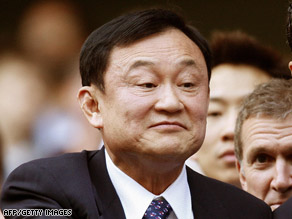The British Embassy has revoked entry visas of ousted prime minister Thaksin Shinawatra and his wife Pojaman.

The cancellation, which was decided while the couple were outside England, has been notified to airlines yesterday.
The decision was made by the United Kingdom Border Agency, and the notification email was signed by Bangkok-based Immigration Liaison Manager Andy Gray.
The email read:
"Dear All,
The United Kingdom Border Agency has revoked the UK visas held by the following Thai nations:
Thaksin Shinawatra. Thai Passport Number D215863
Potjaman Shinawatra. Thai Passport Number D206635
The UK visas contained in the passports of the individuals listed above are no longer valid for travel.
Airlines are advised not to carry these passengers to the UK"
*** end *****
The embassy would not comment on the report. Contacted embassy officials said they "cannot comment on policy matters."
It was a big political blow for Thaksin, who was believed to be on his way from China to the Philippines yesterday. It was understood that the cancellation had to do with the recent court rulings that found Pojaman guilty of tax evasion and Thaksin guilty of breaking the conflict of interest law in the Ratchadapisek land purchase scandal.
Their children's British visas are still valid.
A senior People Power Party politician who has been in China this week answered The Nation's phone contact but replied to the inquiry about Thaksin's visa situation with only "I don't know. I don't know."
Thaksin has always described England as a "democratically mature" country as compared to Thailand. But he always denied having applied for asylum although he said England would be the country where he wanted to live in exile.
Last Saturday, in a controversial long-distance phone-in from Hong Kong, Thaksin accused his political opponents of breaking his family apart. In the same address, he also begged for royal pardon or a popular show of force to bring him back to Thailand.
"Nobody can bring me back to Thailand, except royal kindness of HM the King or the power of the people," Thaksin said. He also claimed that many countries have offered him "honorary citizenship", "which made me a bit sad because I could do many things for anybody else in the world, but nothing now for my country."
The statement triggered a major controversy in Thailand, with Thaksin being accused of trying to drag HM the King into politics. The UK visa move, however, gave Thaksin's statement a whole new perspective, making him sound more like someone desperate to find refuge rather than trying to provoke a political reaction.
It is not immediately known, however, whether Thaksin was aware of the impending visa cancellation before he left England the last time.
A source familiar with the UK legal and diplomatic thinking said the cancellation could have been based on "the different statuses" of Thaksin between the time he was issued the visa and now.
The Supreme Court only found Thaksin guilty in the Ratchadapisek land case late last month, weeks after he fled Thailand during the Beijing Olympics. He fled with his wife, who only days earlier had been found guilty of tax evasion.
England has been under the world community's watchful eyes when Thaksin is concerned. Diplomatic observers have said a decision whether or not to give Thaksin asylum would generate strong ramifications on England's relations with Thailand, as well as London's reputations when democracy, foreign relations and legal principles are concerned.














